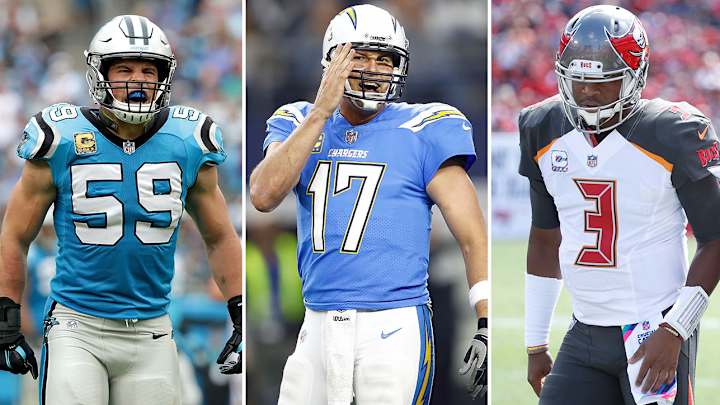The Panthers D Is Better Than Ever, Why Rivers Is Playing His Best Football, Jameis Winston Is Still Frustrating

1.This year’s Panthers defense is more dangerous than the 2015 unit that went to Super Bowl 50. The secondary is better, and first-year coordinator Steve Wilks runs a blitz-intensive scheme. This is a radical change from ex-DC Sean McDermott, a shrewd but judicious blitz-caller. Most teams that blitz a lot need matchup corners. The Panthers, however, are so fast at linebacker that they can afford to consistently blitz out of zone. Instead of four underneath defenders protecting their single-high coverage, there are only three. But the three are Luke Kuechly, Thomas Davis and Shaq Thompson. It might as well be four. Expect more blitzing this Sunday; the Panthers will see it as a way to defend Minnesota’s ground game and force Case Keenum to dink-and-dunk like he did last week against a Falcons defense that held the Vikings to 14 points.
2.There are a few reasons Philip Rivers, entering a Week 14 matchup against Washington, is playing the best football of his (maybe Hall of Fame) career: (1) Because he averaged 17 interceptions a year from 2014-16 (an uncommonly large number of which were not his fault), we forget that’s Rivers is one of the best anticipation passers in football. His precision accuracy is also tremendous. He can still make “all the throws,” as they say. (2) Rivers is a CEO-type presnap quarterback. He has two flexible tight ends (Hunter Henry and Antonio Gates), a superstar wideout who can align anywhere (Keenan Allen) and a multidimensional running back (Austin Ekeler). That’s a lot of matchup pieces to utilize. This helps Rivers consistently beat defenses before the snap. And (3) Rivers’ offensive line has quietly played well, particularly left tackle Russell Okung. For the first time in years, the Chargers offense has a chance to fully function on a snap-by-snap basis.
3. Tampa Bay’s coaching staff has worked diligently to help Jameis Winston walk the fine line between aggression and recklessness. There’s been some progress, but in an honest moment, Dirk Koetter and QB Coach Mike Bajakian would probably tell you they wish their third-year QB were a little further along here. Winston still has four or five wild plays each game, with results varying from spectacular to disastrous. That can work for some guys (see Favre, Brett), but it shouldn’t be the approach for a quarterback with Winston’s high IQ.
4.The Giants have been a huge disappointment, but that doesn’t mean their defensive line isn’t still difficult to run against. It’s imperative the Cowboys O-line dominates the way it did in the second half last Thursday against Washington. Alfred Morris can get the yards that are blocked, and maybe then some if he’s running downhill, but he can’t create on his own. It has become obvious that this offense can’t prosper without its ground game at the forefront.
5.The Bills could be in the market for an edge rusher next year. They recently drafted Shaq Lawson in the first round, but his future is as a base end and passing down defensive tackle. Jerry Hughes, who has an excellent bull rush and a subtly strong toolkit of moves, is still viable, but he hasn’t quite been the everydown edge bender that he was a few years ago.
6.Rams tight end Gerald Everett is starting to get more snaps as a solo receiver on the weak side in trips formations, a la Jimmy Graham, Greg Olsen, Travis Kelce, etc. Last week, Everett beat Cardinals rookie safety Budda Baker on a one-yard touchdown from the backside of a spread 4x1 formation that Sean McVay may or may not have stolen from Seattle (Graham scored on the same play in the Week 12 Niners game). If Everett’s receiving prowess continues to expand, Los Angeles’s offense becomes even more dangerous.
7.Speaking of the Seahawks, they weren’t super successful in two tight end sets against Philadelphia last week. That needs to change Sunday at Jacksonville. The Jaguars have enough speed on defense to contend with Russell Wilson’s sandlot playmaking. A way to counter that speed is to employ extra tight ends up front, forcing linebackers to align closer to the line of scrimmage, leaving them less room to run.
8.Bruce Arians must have a strict gameplan for Blaine Gabbert against Tennessee. Look for a lot of Arizona’s staple stack- and bunch-release routes, which can counter the Titans’ man coverage and quickly present throwing windows. If Gabbert holds the ball, he’s left contending with the complex five-man rushes that define Tennessee’s defense under Dick LeBeau. Gabbert doesn’t have the pocket poise to handle that.
9.Don’t just chalk up another win for the Packers on the road against Cleveland and commence the giddy Aaron Rodgers Returns! talk. Green Bay’s offense still has to play around Brett Hundley, and the Packers defense uncharacteristically struggled for a few stretches against inside zone runs in the win over Tampa Bay. If the Browns shorten the game and mix in selective deep shots to Josh Gordon (remember, the Packers are now without top corner Kevin King), this could be one of those 20-16, maybe 17-13 type upsets.
10.No receiver in NFL history has successfully relied on making contested catches to the extent that Houston’s DeAndre Hopkins has. Every week on film there are plays where you’re startled to see the ball thrown Hopkins’ way (he was so covered that your eyes naturally drift towards other receivers), and even more startled to see these balls caught. San Francisco’s cornerbacks Ahkello Witherspoon and Dontae Johnson do not match up well here. This could be a big week for Hopkins.
• Question or comment? Email us at talkback@themmqb.com.
